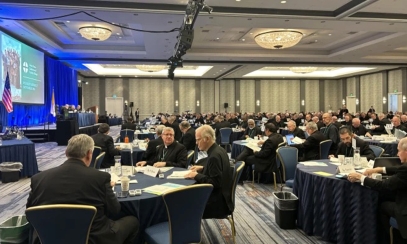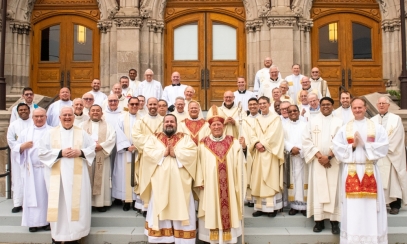
From maintenance to mission
In the beginning of the Book of Revelation, St. John, encouraged by the Holy Spirit, was asked to write what he saw and send it to the seven churches in Asia Minor. He saw Jesus walking through the lampstands of Asia Minor, commenting on what was taking place. After describing these things, Jesus offered correction, advice and promises. Each brief encounter closed with these words: “Whoever has ears ought to hear what the Spirit says to the churches.”
In the beginning of the Book of Revelation, St. John, encouraged by the Holy Spirit, was asked to write what he saw and send it to the seven churches in Asia Minor. He saw Jesus walking through the lampstands of Asia Minor, commenting on what was taking place. After describing these things, Jesus offered correction, advice and promises. Each brief encounter closed with these words: “Whoever has ears ought to hear what the Spirit says to the churches.”
If Jesus continued to walk among the lampstands of our parishes, what correction, advice and promises would his Spirit offer to their leadership and parishioners? An interesting question to reflect upon. Perhaps it would be encouragement centered on the Great Commission: “Go, therefore, and make disciples of all nations…” (Mt. 28:19)
Over the past couple of years, I have been inviting people across the Diocese to join me in being a “Church on Mission” to transform the Diocese. We cannot continue to do what we have always done to meet the current challenges and realities faced by our Diocese and the Church today. The steady decline of people living and practicing their faith dramatically affects not only the Diocese of Saginaw, but also our local Catholic communities across the Diocese.
In other words, we cannot remain in a “maintenance” mindset, which tends toward spiritual complacency and a business-as-usual attitude. More than anything else, in this mindset, parish ministry is more focused on the people in the pews, those who are engaged in parish life to varying degrees. While this may seem important to some, it will never address the steady decline facing our parishes today. If an outsider were to read your pastoral council minutes and review your annual budget, I would suspect that they could easily determine whether the parish is in maintenance mode or truly on mission.
New vision and new zeal are needed, and a conversion of mind, heart and behavior in order to move out of the “maintenance” mindset and into an apostolic vision, one that is fully awake to the reality that society has lost its sense of God and is therefore in a dire situation. We must become a church with the same apostolic zeal as the first-century Christians and be of “one heart and mind.” (Acts 4:32)
What was the driving force behind this apostolic zeal of those early Christians for the proclamation of the Gospel? Their mission, as is ours, was to “to courageously proclaim the transforming power of the Gospel so that Christ Jesus may lead people to salvation through his healing, love and mercy.” No small task! However, it was what led them to lay down their lives for the Lord Jesus. They wholeheartedly embraced the mission by seeing and living through a specific set of lenses that shaped their proclamation of the Gospel.
If that is the case, what stops the average Catholic from doing this? What keeps us from becoming missionary disciples and parishes who “go forth,” who “boldly take the initiative” and “go out to others”? (Joy of the Gospel, 24)
Don’t get me wrong. Maintenance can be seen as something essential and positive, because if authentic, it is about people – about tending the flock in our midst. (1 Pt. 5:2) We must feed the sheep! However, a mission-focused Church is concerned with the hopes, sorrows, joys and eternal destiny of all men, women and children—especially those furthest from Christ and his Church. Therefore, a mission-driven Church focuses more outward than inward.
In the transmission of faith and the Gospel, especially to the new generations, Pope Leo XIV shared: “What great need there is to promote an encounter with God, whose tender love values and loves the story of every person! It is not a matter of giving hasty answers to difficult questions, but of drawing close to people, listening to them, and trying to understand together with them how to face their difficulties. And this requires a readiness to be open, when necessary, to new ways of seeing things and different ways of acting, for each generation is different and has its own challenges, dreams and questions.”
How do parishes move from maintenance to mission? They can begin by assessing their model for mission.
- Is the current model of parish life advancing the mission of Jesus beyond the walls of the church building, or is it maintaining the status quo?
- Is the mission of the parish focused on making disciples who “go out” to seek those who have fallen away or just taking care of those known to them?
- “For every tree is known by its own fruit.” What fruit is being produced by the current programs offered? Are people being led to a deeper life in Jesus? Are they being led into active discipleship?
- “Whoever has ears ought to hear what the Spirit says to the churches.” What is the Holy Spirit saying to the leadership of the parish? Is the parish leadership praying and discerning the Lord’s vision for your parish? A true apostolic mission is always led by the Holy Spirit.
Moving from a maintenance-driven parish to a parish with an apostolic mindset is not easy by any stretch of the imagination. It is a great challenge! But let’s remember that Christ’s Church first began with 12 men seeking to carry the Gospel of Jesus and his vision into the world. We, too, are the disciples of today with the same mandate.
Allow me to conclude with the words of the late Pope Francis:
“The Church which ‘goes forth’ is a community of missionary disciples who take the first step, who are involved and supportive, who bear fruit and rejoice. An evangelizing community knows that the Lord has taken the initiative, he has loved us first (cf. 1 Jn. 4:19), and therefore we can move forward, boldly take the initiative, go out to others, seek those who have fallen away, stand at the crossroads and welcome the outcast. Such a community has an endless desire to show mercy, the fruit of its own experience of the power of the Father’s infinite mercy. Let us try a little harder to take the first step and to become involved. Jesus washed the feet of his disciples. The Lord gets involved and he involves his own, as he kneels to wash their feet. He tells his disciples: “You will be blessed if you do this.” (Jn. 13:17) [Joy of the Gospel, #24]
As Cardinal Raniero Cantalamessa said, “The Church is not a rowboat driven forward by the strength and skill of the arms of those who are in her, but a sailboat driven by the wind which blows it along ‘from above’.”
The Most Rev. Robert D. Gruss is the seventh bishop of the Catholic Diocese of Saginaw.



